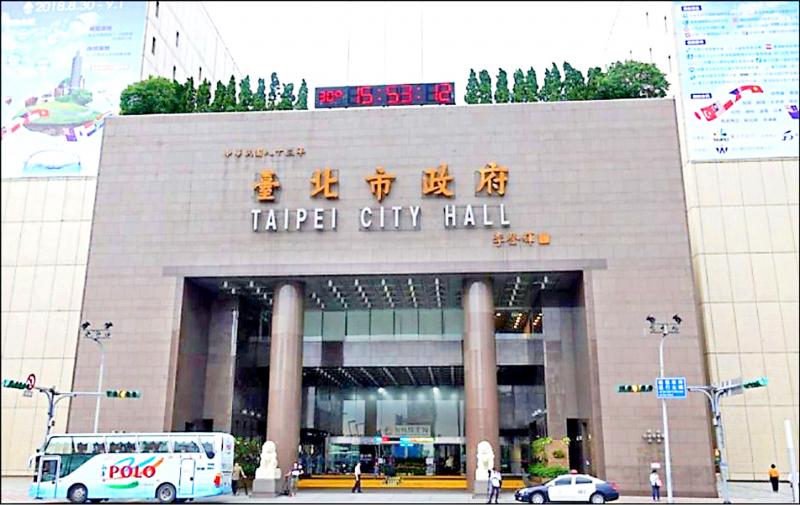The Taipei City Government gave recordings of residents’ helpline calls to a private firm, violating the rights of the callers, two city councilors said yesterday.
Taipei city councilors Miao Po-ya (苗博雅), of the Democratic Progressive Party, and Wu Pei-yi (吳沛憶), of the Social Democratic Party, said the recordings were the callers’ voiceprints, and providing them to an artificial intelligence software developer without their permission violated their rights.
The contract that the city had with the company as part of Taipei’s “smart city” development did not outline penalties for mishandling the recordings, the councilors said, as they called on the city government to temporarily halt the project.

Photo: Taipei Times file photo
Taipei City Research, Development and Evaluation Commission Director Chen Tsung-heng (陳宗亨) said the city informs callers that it records the call, but does not inform them that the recordings are handed over to a contractor.
How the information is managed was determined after work on the project began and had yet to be reviewed by the Taipei Department of Legal Affairs, he said.
Taipei City Department of Information Technology Director Lu Hsin-ko (呂新科) said the project aimed to improve the service on the helpline, and that the city would re-evaluate its handling of the recordings and consult with experts.
The National Development Council yesterday said that under Article 28 of the Personal Data Protection Act (個人資料保護法), public agencies that illegally collect, process or use people’s personal information are liable to pay compensation.
Further investigation is needed to determine whether the city government contravened the law, the council added.
Lawyer Lin Yao-chen (林曜辰) said that while the recordings were legally obtained, the city contravened the law by giving people’s personal data to a contractor and would typically be required to compensate people whose calls were mishandled.
However, as the callers’ identities are unknown, it is unlikely that they would be compensated, he added.
Lin urged the city government to amend its procedures to avoid a recurrence of the situation, and to set clear terms in the company’s contract regarding handling the recordings, including penalties for their misuse.
Even if the callers could not be identified, the project should be halted, Miao said, adding that recordings of about 1,400 people had been sent to the contractor.
Additional reporting by Yang Kuo-wen

A magnitude 7.0 earthquake struck off Yilan at 11:05pm yesterday, the Central Weather Administration (CWA) said. The epicenter was located at sea, about 32.3km east of Yilan County Hall, at a depth of 72.8km, CWA data showed There were no immediate reports of damage. The intensity of the quake, which gauges the actual effect of a seismic event, measured 4 in Yilan County area on Taiwan’s seven-tier intensity scale, the data showed. It measured 4 in other parts of eastern, northern and central Taiwan as well as Tainan, and 3 in Kaohsiung and Pingtung County, and 2 in Lienchiang and Penghu counties and 1

FOREIGN INTERFERENCE: Beijing would likely intensify public opinion warfare in next year’s local elections to prevent Lai from getting re-elected, the ‘Yomiuri Shimbun’ said Internal documents from a Chinese artificial intelligence (AI) company indicated that China has been using the technology to intervene in foreign elections, including propaganda targeting Taiwan’s local elections next year and presidential elections in 2028, a Japanese newspaper reported yesterday. The Institute of National Security of Vanderbilt University obtained nearly 400 pages of documents from GoLaxy, a company with ties to the Chinese government, and found evidence that it had apparently deployed sophisticated, AI-driven propaganda campaigns in Hong Kong and Taiwan to shape public opinion, the Yomiuri Shimbun reported. GoLaxy provides insights, situation analysis and public opinion-shaping technology by conducting network surveillance

‘POLITICAL GAME’: DPP lawmakers said the motion would not meet the legislative threshold needed, and accused the KMT and the TPP of trivializing the Constitution The Legislative Yuan yesterday approved a motion to initiate impeachment proceedings against President William Lai (賴清德), saying he had undermined Taiwan’s constitutional order and democracy. The motion was approved 61-50 by lawmakers from the main opposition Chinese Nationalist Party (KMT) and the smaller Taiwan People’s Party (TPP), who together hold a legislative majority. Under the motion, a roll call vote for impeachment would be held on May 19 next year, after various hearings are held and Lai is given the chance to defend himself. The move came after Lai on Monday last week did not promulgate an amendment passed by the legislature that

Taiwan is gearing up to celebrate the New Year at events across the country, headlined by the annual countdown and Taipei 101 fireworks display at midnight. Many of the events are to be livesteamed online. See below for lineups and links: Taipei Taipei’s New Year’s Party 2026 is to begin at 7pm and run until 1am, with the theme “Sailing to the Future.” South Korean girl group KARA is headlining the concert at Taipei City Hall Plaza, with additional performances by Amber An (安心亞), Nick Chou (周湯豪), hip-hop trio Nine One One (玖壹壹), Bii (畢書盡), girl group Genblue (幻藍小熊) and more. The festivities are to